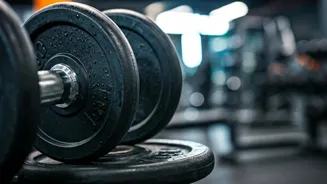Lifting Heavy Weights
One of the most critical aspects of muscle growth is lifting heavy weights. This type of training provides the necessary stimulus to the muscle fibers,
prompting them to adapt and grow stronger. When you lift heavy, you create micro-tears in your muscle fibers. The body then repairs these tears, making the muscles larger and more robust. It’s not just about the weight, but also the type of exercise and the range of motion involved. Compound exercises, which work multiple muscle groups at once, are particularly effective. Incorporating exercises like squats, deadlifts, bench presses, and overhead presses will significantly boost muscle growth. Consistent progressive overload, where you gradually increase the weight or resistance over time, is key to continued gains. This ensures that your muscles are always challenged and growing.
Protein Intake Matters
Protein is the cornerstone of muscle repair and growth. After a strenuous workout, your muscles need protein to rebuild and recover. This process, known as protein synthesis, is crucial for muscle hypertrophy. Without sufficient protein, your body can't effectively repair the micro-tears created during exercise. Experts typically recommend consuming a higher protein intake, such as 1.6 to 2.2 grams of protein per kilogram of body weight, daily for those looking to gain muscle. This can be achieved through a balanced diet that includes lean meats, poultry, fish, eggs, dairy products, and plant-based sources like beans, lentils, and tofu. Timing your protein intake is also important. Eating protein throughout the day, particularly after workouts, provides a steady supply of amino acids, which are the building blocks of protein, to support muscle recovery and growth. Consider a post-workout shake to quickly supply your muscles with protein and essential nutrients.
Rest Days: Importance Revealed
Rest days play a critical role in muscle growth, often overlooked in the pursuit of gains. Muscles do not grow during workouts; they grow during rest and recovery. During intense workouts, your muscle fibers experience stress and tear. The body needs time to repair and rebuild these fibers, a process that occurs during rest. Active recovery, such as light cardio or stretching, can improve blood flow to the muscles and facilitate recovery. Adequate sleep is also essential. During sleep, the body releases growth hormone, which is crucial for muscle repair and growth. Neglecting rest can lead to overtraining, which can result in fatigue, injury, and stalled progress. Incorporating rest days into your workout schedule allows your body to fully recover, reducing the risk of injury and maximizing your gains. Listen to your body and adjust your rest accordingly.
Supplements Can Help
Supplements can significantly aid in muscle growth, although they are secondary to proper training and nutrition. The most effective and well-researched supplement for muscle growth is creatine. Creatine helps increase strength and power, which can lead to greater muscle gains. Whey protein is another popular supplement, especially for its ability to provide a convenient source of high-quality protein. Other supplements like beta-alanine and branched-chain amino acids (BCAAs) can also support muscle recovery and performance. Before starting any supplement, consider consulting with a healthcare professional or a registered dietician. They can help you determine if a supplement is right for you and guide you on proper dosage and usage. Always prioritize a well-rounded diet and consistent workout routine. Supplements should be used to complement a solid foundation, not replace it.
Cardio Hinders Growth?
Cardiovascular exercise, or cardio, can affect muscle growth depending on the intensity, duration, and type of cardio. Excessive cardio can potentially hinder muscle growth because it can increase calorie expenditure, which might lead to a catabolic state, where the body breaks down muscle tissue for energy. However, moderate cardio, such as low-intensity steady-state cardio, generally does not significantly impair muscle growth and can even improve cardiovascular health. The timing of cardio is also important. Performing cardio directly before or after weight training can potentially limit your strength and performance. It's often best to separate cardio and weight training sessions by several hours. If you are aiming for maximum muscle growth, you should focus primarily on weight training and a balanced diet. Consider integrating moderate cardio to support overall health.






















